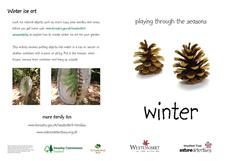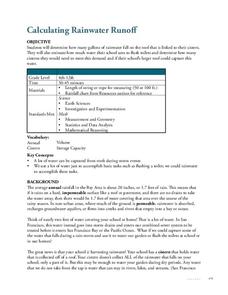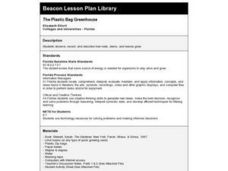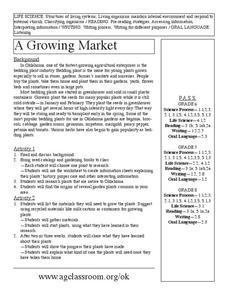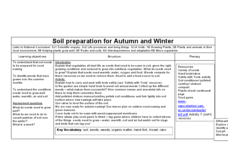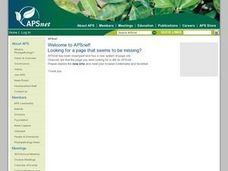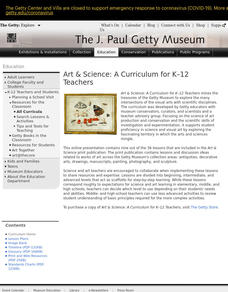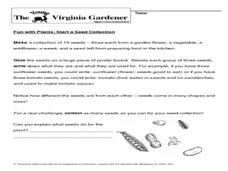Chicago Botanic Garden
Migration, Adaptation, and Changing Climates
It is easy for humans to adapt to changing environments, but how do animals and plants do it? Classes discuss how plants and animals deal with environmental changes in the second of seven lessons. Through questions and discussions,...
Chicago Botanic Garden
Seed Dispersal and Plant Migration
There are five methods of seed dispersal. They include gravity, mechanical, animal, water, and air. Scholars study seed dispersal in lesson five of the series of six. Through discussions, hands-on analysis of different seed types, and...
Chicago Botanic Garden
Plant Phenology Data Analysis
Scientists monitor seasonal changes in plants to better understand their responses to climate change, in turn allowing them to make predictions regarding the future. The last activity in the series of six has scholars analyze BudBurst...
Curated OER
Acid Rain
Simulated acid rain, a dilute sulfuric acid solution, needs to be prepared for this demonstration. After a condensed lecture on acid rain, you will apply the solution to a sample of granite and a sample of limestone. Your young...
Chicago Botanic Garden
Seasons of a Plant
The third in a series of six lessons is an engaging three-part activity defines that discusses phenology, focusing on the cyclic seasons of plants. Pupils then observe phenology outside before determining how climate change can...
Curated OER
Ecology Explorers
Students create accurate, detailed map showing physical features, plants and trees, and other details of three school sites.
Curated OER
Winter Play Pack
Uncover the magic of winter using this winter play pack. Fold it into a book for learners to work through as they explore wildlife during the cold months. They create winter ice art, go on a scavenger hunt for various plants and animals,...
Techbridge Curriculum
Calculating Rainwater Runoff
Thirsty plants soak up every bit of a rainfall, but what happens to the rain that hits the roof? Calculate the amount of rainwater from your school's roof with an Earth science activity, which brings measurement skills, observation...
EngageNY
Nonlinear Models in a Data Context
How well does your garden grow? Model the growth of dahlias with nonlinear functions. In the lesson, scholars build on their understanding of mathematical models with nonlinear models. They look at dahlias growing in compost and...
Curated OER
The Plastic Bag Greenhouse
Third graders observe plants and record their growth. They describe the parts of plants in detail including the roots, stems and leaves.
Curated OER
Grow Your Own Grub
Students study plant needs and growth by completing a gardening activity. In this plant study lesson, students watch a video and discuss plant growth needs. Students plant seeds in containers and water the plants. Students take photos of...
Curated OER
Building a Mini-park And Bird Sanctuary Lesson 3: Location, Location, Location
Students work cooperatively using the democratic process to select a place for a park. They identify how the garden in the park will look. They write a five paragraph essay as an assessment.
Curated OER
Grow Your Own
Students study the growth and care of plants. They take tour of their school site and plant seeds to observe their growth. Afterward, they answer questions about the origin and value of their plants.
Curated OER
A Growing Market
Young scholars research plants and the bedding plant industry and then make a list of materials they need to plant seeds. In this planting lesson plan, students then plant their seeds, chart their progress, and write what they have learned.
Curated OER
Sowing Seeds of the Future
Students explore how to preserve native wild plants and garden crops. In this science lesson plan, students play the role of botanists and research North American plants. Students create a presentation about their findings.
Curated OER
Let it Grow!
Students explain the relationship of plants and animals in the environment. They name the basic requirements for plant growth and define the terms photosynthesis, stomata, chlorophyll and xylem.
Curated OER
Guess What I Came From
First graders examine items made from plants. In this plant lesson, 1st graders read Plants Feed on Sunlight and view a PowerPoint presentation regarding plant growth. Students examine products that are made from plants and draw pictures...
Curated OER
Soil Preparation for Autumn and Winter
Students determine how and why soil needs to be prepared for the fall and winter seasons. In this agriculture instructional activity, students determine how to use gardening tools safely. They show how to work with compost material and...
Curated OER
Don't Wait, Just Propagate
Young scholars explore the process of growing plants from seed. In this propagation lesson, students examine methods of propagation and determine how to rapidly propagate plant species. Young scholars listen to a lecture informing them...
Curated OER
Plant Parts and Their Diseases
Students see how certain plants are very important to us. They explain that healthy plants are important to keep people healthy. They study the major parts of a plant (root, stems, leaves, flowers, fruit and seeds) and their basic...
Curated OER
Learning From Leaves: Adaptations To Differing Light Levels
Young scholars, in groups, examine plants with different light levels. They are given plants from a tropical and desert region. They write a hypothesis at the beginning of the experiment.
Curated OER
Clearly Classified
Learners investigate plants and insects. In this science classification lesson, students create separate categories for insects and plants by characteristics. Learners discover scientific names of insects.
Curated OER
Adopt A Tree
Students list characteristics that make some plants "trees," identify parts of the tree and their basic functions, describe how trees grow, and recognize products we get from trees and the environmental importance of trees.
Curated OER
Start A Seed Collection
In this start a seed collection worksheet, students collect, label and display 15 seeds 3 each from a garden flower, a vegetable, a wildflower, a weed and the kitchen, and observe the differences.








